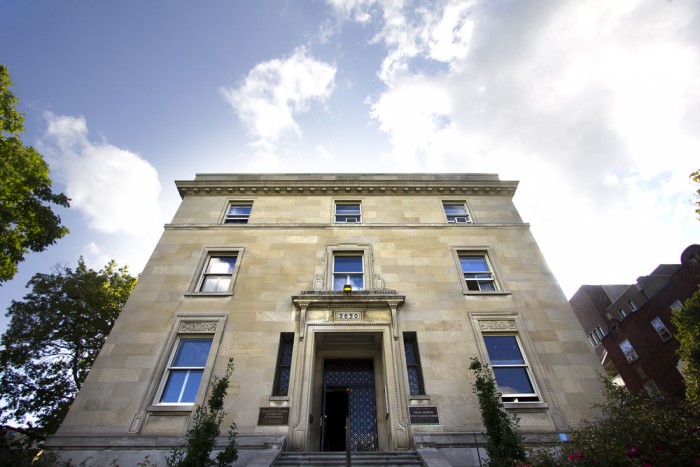The Post-Graduate Students’ Society of McGill (PGSS) hosted its first General Meeting (GM) on Wednesday, Oct.14, passing a motion to divest holdings in companies within fossil fuel industries, updating members on the new Quebec student federations, and reviewing the Sustainability Projects Fund (SPF).
Divest McGill
A motion calling upon McGill to remove investment from oil and gas industries was unanimously passed. The vote followed a presentation by Victor Frankel, PGSS environment commissioner and member of Divest McGill—a group that aims to encourage McGill to divest from its holdings in fossil fuel industries.
“This isn’t about bankrupting the fossil fuel companies, this is about taking away their social license to operate,” Frankel said.
McGill currently has roughly eight per cent of its endowments invested in fossil fuels, which is equivalent $70 million invested in petroleum companies, including Chevron, Suncor, and Enbridge. Divest McGill has asked the administration to divest from companies within the next three to five years.
“[The motion starts] from the things that are the least contentious,” Frankel said. “Like [recognizing] that climate change is real, to things that are fairly reasonable like freezing or having a moratorium on any new investments in fossil fuels […] to the more contentious issues […] which says that PGSS strongly endorses divestment from fossil fuel companies and also supports efforts of its senators and members at the board of governors to strongly support divestment.”
According to Frankel, through this motion, Divest McGill hopes to follow the example of schools such as the University of Glasgow and Syracuse University, which have successfully divested. Full divestment has yet to be achieved by any Canadian university.
Report on new Quebec student federations
PGSS External Affairs Officer, Bradley Por, reported on the status of the PGSS in relation to the two new student federations forming in Quebec. Both PGSS and the Students’ Society of McGill University (SSMU) have participated in the formation of both federations, the Union étudiante du Quebec (UÉQ) and the Association for the Voice of Education in Quebec (AVEQ). PGSS has signed a document to commit to the formation of the UÉQ, but has not yet become an affiliated member of either.
“Over the course of that new federation being created, there was a rift […] and the regional unions left to start creating [another federation] what is now called the UÉQ,” Por said. “So now, PGSS is sitting at both tables, despite that initial signing.”
According to Por, PGSS is looking into the most effective way of joining a federation, while participating in working groups to form the association until a democratic decision is made to affiliate with one.
“At the moment, I have Conor [Farrell], our PGSS researcher, working on how affiliations [have] been done in the past so we can put together a referendum question that lets the student body decide on which one to [join],” said Por.
Both federations will be coming to campus to talk to students, and prior to the upcoming referendum, PGSS will host a closed session with representatives from the federations.
Sustainability Projects fund’s fiscal year 2015 annual report
SPF Officer Kim McGrath presented an update to the PGSS on the fund’s performance over the past year.
The fund entails a 50 cent contribution by students in SSMU and PGSS, per credit, which is matched dollar for dollar by the McGill administration. This culminates in an $850,000 fund per year.
“Three areas were our main focus for projects: Connectivity, operations, and education,” said McGrath. “Connectivity was more of a focus for PGSS this year. In operations, the focus was […] on lab waste—preventing it and reducing [it]. And there was also the Thomson House community garden […. In the faculty of] Education, one significant project […was] outdoor eco-learning.”
This year, the annual report, which spanned from January 2014 to April 2015, saw 49 applications for funding—26 of which were approved—at a total value of $740,000.
The fund, which grants the money to projects through a system of reimbursement, will try to reduce repayment lag in the coming year.
“We’re almost on track financially,” McGrath said. “There was some overspending before the new team came in, and we’re almost at the same level for allocation and […]expenditures.”
Other areas of focus for this academic year are outreach, monitoring and reporting, in addition to the creation of more committees and SPF ambassadors.








